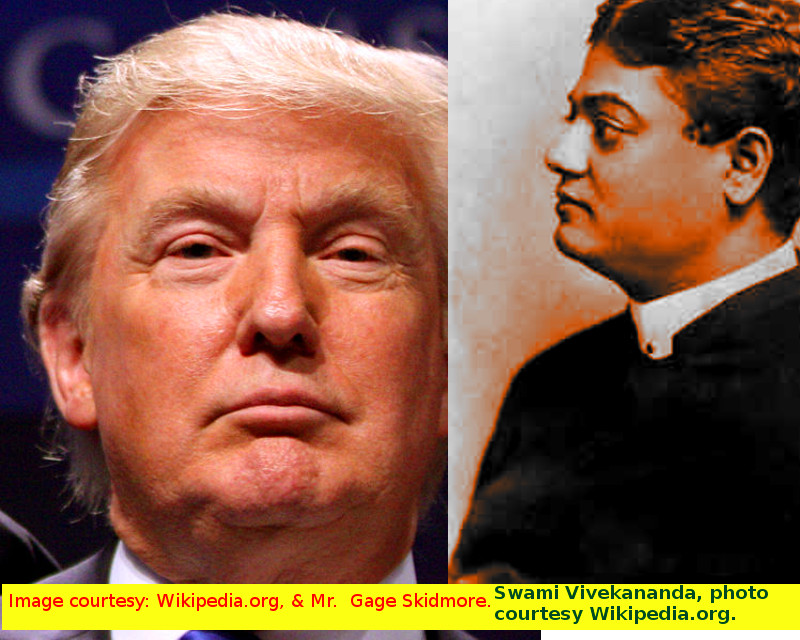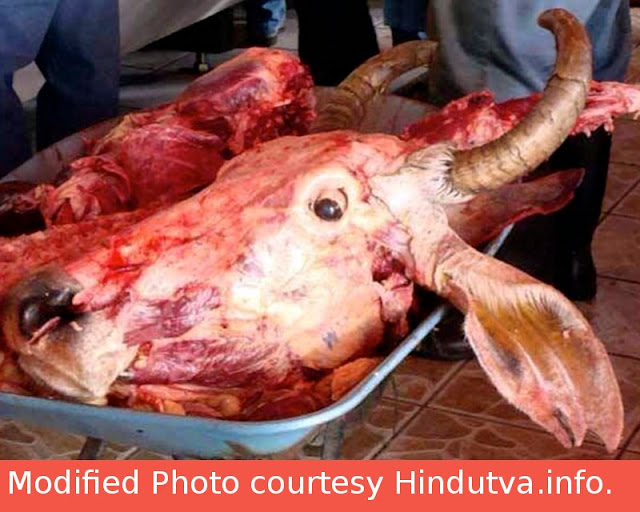#43, it is to Amerique — there where the heart is
In May 1896 Swami Vivekananda wrote to Ms. Alberta Sturges (age 19) that he liked Amerique - the yankee land. He called India a jelly fish.
" ... I have had two classes already — they will go on for four or five months and after that to India I go. But it is to Amerique — there where the heart is. I love the Yankee land. I like to see new things. I do not care a fig to loaf about old ruins and mope a life out about old histories and keep sighing about the ancients. I have too much vigour in my blood for that. In America is the place, the people, the opportunity for everything. I have become horribly radical. I am just going to India to see what I can do in that awful mass of conservative jelly-fish, ... "
BLOGGER'S VIEWS
Let Swamiji love the yankee land as much as he likes. Why call India a jelly fish?
*Ms. Indra Nooyi, C.E.O. of Pepsico is reported to have said:
“Where I am has a lot to do with the United States. I think the United States represents the greatest meritocracy in the world,”
Her love of Yankee land is similar to Swamiji's love of the yankee land. But Swamiji reversed his love in seven years.
Swamiji wrote to Ms. Ole Bull on the 17th Jan. 1900 during his second visit to USA:
"...No, not even that; whenever it comes to paying, the people are nowhere. The field of lecturing in this country has been overworked; the people have outgrown that...."
"...They come in crowds when there is a free lecture and very few when there is something to pay...
"...No money. Hard work. No result. Worse than Los Angeles.
They come in crowds when the lecture is free — when there is payment, they don't. That's all..."
On March 27, 1895 Vivekananda wrote to Ms. Isabelle Mckindley from New York.
"...This is a wonderful country for cheating, and 99.9 per cent have some motive in the background to take advantage of others. If any one just but closes his eyes for a moment, he is gone!! ..."
*If these are the disappointments of Vivekananda in Yankee land, what will Ms. Indra Nooyi say, if she loses her plum job?



Comments
vamsee-naidu.blogspot.com
Shri Vamsee
Thank you friends. The notes and observations I have made in these posts are only preliminary and may be reversed/revised/corrected if/when fresh evidence/ideas are received. The information available on the net is what Vivekananda wrote to others and that too 'edited/excised/censored' by those who placed them on the net. There is a term used by R W Emerson called 'sectary' which means those who worship a person beyond limits and become members of the sect. The sectaries belonging to Ramakrishna/Vivekananda sect may restrict the information avilable on the net. The letters received by Vivekananda are to be searched to make meaningful deductions; otherwise whatever approximations we make may fall way behind truth. The sectaries have to release them, if the world is to know full truth.
Picking on minor comments and making them rules is no Good. Vivekananda stood for India and Vedanta. He is an enlightened soul and his comments have to be seen in the light of his larger perspectives.
If I say that Indian highways are in a bad shape compared to that of Swiss, I am connotating a sense of urgency to work them up to better standards and not being cynical in any which way.
vamsee-naidu.blogspot.com
1. WWW.ramakrishnavivekananda.info.
2. WWW.vivekananda.net.
If you are not satisfied with wikipedia or the above two sites, you can go for a google/yahoo search and select the most convenient one.
About editing of the letters made by different publishers, they seem to have same source because same portions have been excised. Since only unfavourable portions seem to have been excised, it is reasonable to presume that the originals were published by Ramakrishna/Vivekananda Sectaries and were genuine. I welcome questions from you because I wish to correct myself wherever and in case I have gone wrong. I shall try to answer and convince you to the best of my ability, of course if you will not misunderstand me and forgive my omissions and commissions. This will save some labour for you.
The comments picked up by me, as on date, I am unable to view them as minor.
About two years back I was helping a friend who was studying for M.A Telugu Literature. (I believe that you know Telugu). For M.A. Telugu, Gurajada Appa Rao's "Kanya Sulkam" was prescribed. It's first version was published around 1897. Second enlarged version was published around 1906 when Vande Mataram was in full swing. You can see the role of Girisam wielding a cigar in his hand and lecturing to his disciple Venkatesam. When I read the Complete Works of Vivekananda on Net, every moment compulsively Girisam's character was coming into my mind. The letters wrote by Vivekananda to his prime Madras disciple Alasinga particularly remind the scene of Girisam-Venkatesam. Vivekananda's letters to Rakhal (Brahmananda) and others also have some similar dialogues.
It is also not reasonable to say that Vivekananda stood for India and Vedanta. He made a pretense. He went abroad at a time when Americans were not much aware of Hinduism. He found that American High Class Women had time to hear to lectures while sipping alcohol. There were "lecture organising firms" giving wide newspaper publicity and arranging lecture halls. They were paying a pittance to Vivekananda, retaining bulk for themselves.
The first series of books such as Raja Yoga published from London in association with E T Sturdy (a good Sanskrit scholar who shifted to Theosophical Society later departing from Vivekananda)have been edited well. (Around 1895-96).
I can only say that the Advaita Vedanta books written by him are not upto mark in several respects. If we have to analyse them we have to write several blogs spending several net hours.
Anyway he has not practised the Vedanta he preached in his lectures or books. He himself was confused between Bhakti (devotion) and Gnaana (Knowledge). Shankarachrya preached Gnaana. SV's Guru Ramakrishna preached Bhakti. During his last days SV himself confessed that he was drifting towards devotion. Sacrificing the goat at Math to propiate the Goddess Durga is a proof for this.
The Western people do not know the meaning of true Hindu monkhood. If SV was unable to live like a true monk, nobody would have compelled him to live like that. He could have dispensed with his ochre robes and worked sincerely as a Information-spreader of Hinduism. Once a person wears ochre robes, expectations will rise.
About serving the poor: While I do not doubt SV's sincerity, his work in this area was blown up by those who have not read his Complete Works thoroughly. SV's disciples and RK Math and other institutions might have/have been doing great service. But this does not make SV India's sole representative of Hinduism.
About raising standards: Vivekananda's lectures and letters were specklessly edited to cosmetic beauty. Indian youth particularly Hindu youth can easily be misled.
Back to Gurajada Appa Rao's Kanya Sulkam: He might not have seen Vivekananda. There is a Telugu proverb: "Ravi kaanani coo kavi gaancu neyyed`an". What the Sun cannot penetrate and see, a poet/writer can penetrate through.
One clarification: Without advertising Vivekananda, we can serve the cause of Mother India's poor. Charity and Mat`ha's, Lion's and Rotaries cannot solve the problems of poor. There is a need for replacement of political and economic structure to promote redistribution of wealth. For that we have to remove private property. You cannot have Ambanis Tatas and Zindals in a poor country. We have to trod a different path.
I shall not blame Vivekananda for his omissions, commissions, strengths and weaknesses. Just like us, he too has his own.
Though I am a small fry, I have complete sympathy and empathy for Vivekananda. He was operating in Capitalist and Imperialist countries like US and Britain. He was moving at a time there was no air or motor transport. For his food, drink, cigars, he was dependent on his patrons/donors. Sometimes, it might have been necessary for him to search for his food.
Particularly what I do not appreciate in Vivekananda was his excess meekness before his donors and rudeness to his brother-disciples (he himself admitted to Mrs. Ole Bull); his prostration before the US and condescension to the poor sons of Bharat.
I invite your specific questions. I shall try to answer them with evidence from Complete Works of Vivekananda.
One thing that I am really curious about is the "end of Vivekananda". Is it true that he entered samadhi voluntarily?
I am very much a telugu; but roamed all around India and currently live and work in Switzerland.
Question:
Is it true that VIVEKANANDA entered his samadhi voluntarily?
Ans:
I furnish below a link which depicts his last moments. From it, it can be found that his death was natural.
www.ramakrishnavivekananda.info/vivekananda_biography/13_towards_the_end.htm.
SAMADHI
-------
This word has two meanings:
1. physical samadhi = tomb or monument. Often for Hindus it is a chamber built underground with stairs etc. There are stories of some yogis entering the physical tomb alive and dying therein without food. A sort of suicide. There are instances of yogis being forcibly sent into the chamber and closing its doors to prevent his leaving. To the external world it is made out that the samadhi is voluntary. -- This voluntary/forced entry may not be true for Vivekananda. His death seems quite natural.
2. Intellectual samadhi or deep immersion in meditation and becoming unconscious and breathing last in that State. The probability of this type of death for Vivekananda is nearly 90%.
BELOW IS NOT A COMMENT ON VIVEKANANDA'S DEATH
-------------------------
Incidentally I am tempted to give another example (though irrelevant here, I as a blogger I cannot resist writing this laughable piece). You might have seen the Telugu film Lavakusa released around 1963 with NTR as Shri Rama, Anjali as Sita. In the last scene NTR was shown as entering the river Sarayu, walking into it slowly, while Veda Mantras were chanted. One critic commented that Rama committed suicide by jumping in the Sarayu river. Whether Rama really committed suicide or not, the idea of his doing it does not arouse pity because he made
Sita to jump into fire, he got her abandoned in the forest while pregnant without even being informed that she is being dropped, and then awarded death to loyal Lakshmana for permitting Durvasa inside (which Rama's ministers commuted to Lakshmana's exile as equal to death). When he can ask everybody to get killed, why not he kill himself?
BACK TO VIVEKANANDA
-------------------
We are all humans with human strengths and weaknesses. Where is the place for halos? The term "Maha samaadhi" not only for Vivekananda for all monks, therefore, becomes hyperbolic. The disciples of yogis use it because they are taught to revere their Gurus beyond limits. In fact Mr. E T Sturdy wrote one piece of essay on "Gurus and Chelas (disciples)" after parting ways with Vivekananda. It is available on some websites of Theosophy. If you are interested, I shall make Google search and give the link here in my next comment. We need not agree 100% with what Mr. E.T. Sturdy wrote there.